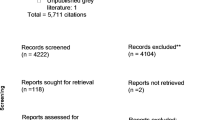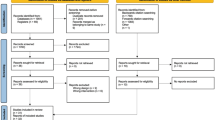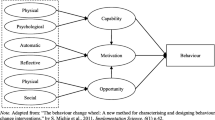Abstract
The present study investigated whether psychosocial determinants mediate the effect of a telephone coaching intervention on physical activity levels. Two hundred eighty-eight adults were randomly assigned to a six-month telephone coaching intervention (n = 12 calls) or a control group receiving a single written recommendation. Seven psychosocial determinants as defined in the MoVo model as well as objective and self-reported physical activity levels were measured after 6 and 12 months. Participants also reported which taught intervention strategies (behavior change techniques) they perceived as most useful. Structural equation modeling was used to determine the mediating role of psychosocial determinants. Up to 227 participants with complete data on psychosocial determinants and physical activity were included in the mediation analyses. Compared to the control group, a greater increase in self-reported and objectively assessed physical activity levels was observed the coaching intervention group. The mediation analyses showed that the intervention had a positive effect on self-efficacy, outcome expectations and intention strength after 6 months and on action planning and barrier management after 6 and 12 months. Increases in objectively assessed physical activity after 6 months were mediated by increased barrier management. None of the other psychosocial determinants worked as mediating factors on self-reported or objectively assessed physical activity. The participants perceived ‘action planning’ and ‘problem solving’ as the most useful strategies to increase their physical activity levels. Further understanding of working mechanisms of remote physical activity promotion is needed.

Similar content being viewed by others
References
Ajzen, I. (1991). The theory of planned behavior. Organizational Behavior and Human Decision Processes,50, 179–211. https://doi.org/10.1016/0749-5978(91)90020-T
Bandura, A. (1998). Health promotion from the perspective of social cognitive theory. Psychology & Health,13, 623–649.
Baruth, M., Wilcox, S., Dunn, A. L., King, A. C., Marcus, B. H., Rejeski, W. J., et al. (2010). Psychosocial mediators of physical activity and fitness changes in the activity counseling trial. Annals of Behavioral Medicine,39, 274–289. https://doi.org/10.1007/s12160-010-9178-4
Bird, E. L., Baker, G., Mutrie, N., Ogilvie, D., Sahlqvist, S., & Powell, J. (2013). Behavior change techniques used to promote walking and cycling: A systematic review. Health Psychology,32, 829–838. https://doi.org/10.1037/a0032078
Buscemi, J., Janke, E. A., Kugler, K. C., Duffecy, J., Mielenz, T. J., St George, S. M., et al. (2017). Increasing the public health impact of evidence-based interventions in behavioral medicine: New approaches and future directions. Journal of Behavioral Medicine,40, 203–213. https://doi.org/10.1007/s10865-016-9773-3
Cane, J., Richardson, M., Johnston, M., Ladha, R., & Michie, S. (2015). From lists of behaviour change techniques (BCTs) to structured hierarchies: Comparison of two methods of developing a hierarchy of BCTs. British Journal of Health Psychology,20, 130–150. https://doi.org/10.1111/bjhp.12102
Cole, R. J., Kripke, D. F., Gruen, W., Mullaney, D. J., & Gillin, J. C. (1992). Automatic sleep/wake identification from wrist activity. Sleep,15, 461–469.
Dimmock, J. A., & Banting, L. K. (2009). The influence of implicit cognitive processes on physical activity: how the theory of planned behaviour and self-determination theory can provide a platform for our understanding. International Review of Sport and Exercise Psychology,2, 3–22. https://doi.org/10.1080/17509840802657337
Dombrowski, S. U., Sniehotta, F. F., Avenell, A., Johnston, M., MacLennan, G., & Araújo-Soares, V. (2012). Identifying active ingredients in complex behavioural interventions for obese adults with obesity-related co-morbidities or additional risk factors for co-morbidities: A systematic review. Health Psychology Review,6, 7–32. https://doi.org/10.1080/17437199.2010.513298
Fischer, X., Donath, L., Zwygart, K., Gerber, M., Faude, O., & Zahner, L. (2019a). Coaching and prompting for remote physical activity promotion: Study protocol of a three-arm randomized controlled Trial (Movingcall). International Journal of Environmental Research and Public Health,16, 331. https://doi.org/10.3390/ijerph16030331
Fischer, X., Kreppke, J., Zahner, L., Gerber, M., Faude, O., & Donath, L. (2019b). Telephone-based coaching and prompting for physical activity: Short- and long-term findings of a randomized controlled trial (Movingcall). International Journal of Environmental Research and Public Health,16, 2626.
Foster, C., Richards, J., Thorogood, M., & Hillsdon, M. (2013). Remote and web 2.0 interventions for promoting physical activity. Cochrane Database of Systematic Reviews,9, Cd010395.
Fransson, E. I., Heikkila, K., Nyberg, S. T., Zins, M., Westerlund, H., Westerholm, P., et al. (2012). Job strain as a risk factor for leisure-time physical inactivity: an individual-participant meta-analysis of up to 170,000 men and women: the IPD-Work Consortium. American Journal of Epidemiology,176, 1078–1089. https://doi.org/10.1093/aje/kws336
Fuchs, R. (1994). Konsequenzerwartungen als Sport- und Bewegungsverhaltens. Zeitschrift für Gesundheitspsychologie,2, 269–291.
Fuchs, R. (1997). Psychologie und körperliche Bewegung: Grundlagen für theoriegeleitete Interventionen. Göttingen: Hogrefe Verlag für Psychologie.
Fuchs, R. (2007). Aufbau eines körperlich-aktiven Lebensstils: Theorie, Empirie und Praxis. Göttingen: Hogrefe.
Fuchs, R. (2008). Aufbau eines körperlich-aktiven Lebensstils im Kontext der medizinischen Rehabilitation: Ein motivational-volitionales Interventionskonzept (MoVo-LISA Projekt). Freiburg im Breisgau: Universität Freiburg.
Fuchs, R., Seelig, H., Gohner, W., Burton, N. W., & Brown, W. J. (2012). Cognitive mediation of intervention effects on physical exercise: Causal models for the adoption and maintenance stage. Psychology & Health,27, 1480–1499. https://doi.org/10.1080/08870446.2012.695020
Fuchs, R., Seelig, H., Gohner, W., Schlatterer, M., & Ntoumanis, N. (2017). The two sides of goal intentions: Intention self-concordance and intention strength as predictors of physical activity. Psychology & Health,32, 110–126. https://doi.org/10.1080/08870446.2016.1247840
Gerber, M., Fuchs, R., & Pühse, U. (2010). Follow-up of a short motivational and volitional exercise-intervention trial with overweight and obese individuals. Schweiz. Z. Sportmed. Sporttraumatologie,58, 108–114.
Göhner, W., Seelig, H., & Fuchs, R. (2009). Intervention effects on cognitive antecedents of physical exercise: A 1-year follow-up study. Applied Psychology: Health and Well-Being,1, 233–256. https://doi.org/10.1111/j.1758-0854.2009.01014.x
Goode, A. D., Reeves, M. M., & Eakin, E. G. (2012). Telephone-delivered interventions for physical activity and dietary behavior change: An updated systematic review. American Journal of Preventive Medicine,42, 81–88. https://doi.org/10.1016/j.amepre.2011.08.025
Howlett, N., Trivedi, D., Troop, N. A., & Chater, A. M. (2018). Are physical activity interventions for healthy inactive adults effective in promoting behavior change and maintenance, and which behavior change techniques are effective? A systematic review and meta-analysis. Translational Behavioral Medicine,9, 147–157. https://doi.org/10.1093/tbm/iby010
Johnson, S. T., Lubans, D. R., Mladenovic, A. B., Plotnikoff, R. C., Karunamuni, N., & Johnson, J. A. (2016). Testing social-cognitive mediators for objective estimates of physical activity from the Healthy Eating and Active Living for Diabetes in Primary Care Networks (HEALD-PCN) study. Psychology, Health & Medicine,21, 945–953. https://doi.org/10.1080/13548506.2016.1140900
Kamada, M., Shiroma, E. J., Harris, T. B., & Lee, I. M. (2016). Comparison of physical activity assessed using hip- and wrist-worn accelerometers. Gait and Posture,44, 23–28. https://doi.org/10.1016/j.gaitpost.2015.11.005
Kraemer, H. C., Wilson, G. T., Fairburn, C. G., & Agras, W. S. (2002). Mediators and moderators of treatment effects in randomized clinical trials. Archives of General Psychiatry,59, 877–883.
Lee, I. M., Shiroma, E. J., Lobelo, F., Puska, P., Blair, S. N., & Katzmarzyk, P. T. (2012). Effect of physical inactivity on major non-communicable diseases worldwide: An analysis of burden of disease and life expectancy. Lancet,380, 219–229. https://doi.org/10.1016/s0140-6736(12)61031-9
MacKinnon, D. P., Fairchild, A. J., & Fritz, M. S. (2007). Mediation analysis. Annual Review of Psychology,58, 593–614. https://doi.org/10.1146/annurev.psych.58.110405.085542
Marcus, B. H., & Forsyth, L. A. (2003). Motivating people to be physically active. Champaign: Human Kinetics.
Michie, S., Abraham, C., Whittington, C., McAteer, J., & Gupta, S. (2009). Effective techniques in healthy eating and physical activity interventions: A meta-regression. Health Psychology,28, 690–701. https://doi.org/10.1037/a0016136
Michie, S., Johnston, M., Francis, J., Hardeman, W., & Eccles, M. (2008). From theory to intervention: Mapping theoretically derived behavioural determinants to behaviour change techniques. Applied Psychology,57, 660–680. https://doi.org/10.1111/j.1464-0597.2008.00341.x
Michie, S., Richardson, M., Johnston, M., Abraham, C., Francis, J., Hardeman, W., et al. (2013). The behavior change technique taxonomy (v1) of 93 hierarchically clustered techniques: Building an international consensus for the reporting of behavior change interventions. Annals of Behavioral Medicine,46, 81–95. https://doi.org/10.1007/s12160-013-9486-6
Napolitano, M. A., Papandonatos, G. D., Lewis, B. A., Whiteley, J. A., Williams, D. M., King, A. C., et al. (2008). Mediators of physical activity behavior change: A multivariate approach. Health Psychology,27, 409–418. https://doi.org/10.1037/0278-6133.27.4.409
Nigg, C. R. (2013). ACSM’s behavioral aspects of physical activity and exercise. Little Rock: Lippincott Williams & Wilkins.
Noar, S. M., Benac, C. N., & Harris, M. S. (2007). Does tailoring matter? Meta-analytic review of tailored print health behavior change interventions. Psychological Bulletin,133, 673–693. https://doi.org/10.1037/0033-2909.133.4.673
Olander, E. K., Fletcher, H., Williams, S., Atkinson, L., Turner, A., & French, D. P. (2013). What are the most effective techniques in changing obese individuals’ physical activity self-efficacy and behaviour: A systematic review and meta-analysis. International Journal of Behavioral Nutrition and Physical Activity,10, 29. https://doi.org/10.1186/1479-5868-10-29
Papandonatos, G. D., Williams, D. M., Jennings, E. G., Napolitano, M. A., Bock, B. C., Dunsiger, S., et al. (2012). Mediators of physical activity behavior change: Findings from a 12-month randomized controlled trial. Health Psychology,31, 512–520. https://doi.org/10.1037/a0026667
Pedisic, Z., & Bauman, A. (2015). Accelerometer-based measures in physical activity surveillance: Current practices and issues. British Journal of Sports Medicine,49, 219–223. https://doi.org/10.1136/bjsports-2013-093407
Podsakoff, P. M., MacKenzie, S. B., Lee, J. Y., & Podsakoff, N. P. (2003). Common method biases in behavioral research: A critical review of the literature and recommended remedies. Journal of Applied Psychology,88, 879–903. https://doi.org/10.1037/0021-9010.88.5.879
Preacher, K. J., & Hayes, A. F. (2008). Asymptotic and resampling strategies for assessing and comparing indirect effects in multiple mediator models. Behavior Research Methods,40, 879–891.
Prochaska, J. O., & Velicer, W. F. (1997). The transtheoretical model of health behavior change. American Journal of Health Promotion,12, 38–48. https://doi.org/10.4278/0890-1171-12.1.38
Rhodes, R. E., & Pfaeffli, L. A. (2010). Mediators of physical activity behaviour change among adult non-clinical populations: A review update. International Journal of Behavioral Nutrition and Physical Activity,7, 37. https://doi.org/10.1186/1479-5868-7-37
Rosenbaum, S., & Ward, P. B. (2016). The simple physical activity questionnaire. Lancet Psychiatry,3, e1. https://doi.org/10.1016/s2215-0366(15)00496-4
Ryan, R. M., & Deci, E. L. (2000). Self-determination theory and the facilitation of intrinsic motivation, social development, and well-being. American Psychologist,55, 68–78.
Sallis, J. F., & Saelens, B. E. (2000). Assessment of physical activity by self-report: Status, limitations, and future directions. Research Quarterly for Exercise and Sport,71, 1–14. https://doi.org/10.1080/02701367.2000.11082780
Samdal, G. B., Eide, G. E., Barth, T., Williams, G., & Meland, E. (2017). Effective behaviour change techniques for physical activity and healthy eating in overweight and obese adults; systematic review and meta-regression analyses. International Journal of Behavioral Nutrition and Physical Activity,14, 42. https://doi.org/10.1186/s12966-017-0494-y
Schilling, R., Scharli, E., Fischer, X., Donath, L., Faude, O., Brand, S., et al. (2018). The utility of two interview-based physical activity questionnaires in healthy young adults: Comparison with accelerometer data. PLoS ONE,13, e0203525. https://doi.org/10.1371/journal.pone.0203525
Seelig, H., & Fuchs, R. (2006). Messung der sport- und bewegungsbezogenen Selbstkonkordanz. Zeitschrift für Sportpsychologie,13, 121–139. https://doi.org/10.1026/1612-5010.13.4.121
Sniehotta, F. F., Scholz, U., & Schwarzer, R. (2005a). Bridging the intention–behaviour gap: Planning, self-efficacy, and action control in the adoption and maintenance of physical exercise. Psychology & Health,20, 143–160. https://doi.org/10.1080/08870440512331317670
Sniehotta, F. F., Schwarzer, R., Scholz, U., & Schüz, B. (2005b). Action planning and coping planning for long-term lifestyle change: Theory and assessment. European Journal of Social Psychology,35, 565–576. https://doi.org/10.1002/ejsp.258
Stacey, F. G., James, E. L., Chapman, K., & Lubans, D. R. (2016). Social cognitive theory mediators of physical activity in a lifestyle program for cancer survivors and carers: Findings from the ENRICH randomized controlled trial. International Journal of Behavioral Nutrition and Physical Activity,13, 49. https://doi.org/10.1186/s12966-016-0372-z
Stamm, H. P., Fischer, A., Wiegand, D., & Lamprecht, M. (2017). Indikatorensammlung zum monitoring-system Ernährung und Bewegung (MOSEB). Bern: Bundesamt für Gesundheit (BAG).
Teixeira, P. J., Carraca, E. V., Marques, M. M., Rutter, H., Oppert, J. M., De Bourdeaudhuij, I., et al. (2015). Successful behavior change in obesity interventions in adults: A systematic review of self-regulation mediators. BMC Medicine,13, 84. https://doi.org/10.1186/s12916-015-0323-6
Troiano, R. P. (2007). Large-scale applications of accelerometers: New frontiers and new questions. Medicine and Science in Sports and Exercise,39, 1501. https://doi.org/10.1097/mss.0b013e318150d42e
Van Sluijs, E. M., Griffin, S. J., & Van Poppel, M. N. (2007). A cross-sectional study of awareness of physical activity: Associations with personal, behavioral and psychosocial factors. International Journal of Behavioral Nutrition and Physical Activity,4, 53. https://doi.org/10.1186/1479-5868-4-53
Vandelanotte, C., Muller, A. M., Short, C. E., Hingle, M., Nathan, N., Williams, S. L., et al. (2016). Past, present, and future of eHealth and mHealth research to improve physical activity and dietary behaviors. Journal of Nutrition Education and Behavior,48, 219–228.e211. https://doi.org/10.1016/j.jneb.2015.12.006
WHO. (2010). Global recommendations on physical activity for health. (9789241599979). Geneva: World Health Organization.
Funding
The study was funded by the Department of Sport, Exercise and Health of the University of Basel. The interest of the funding body lies in the scientific research question as well as in the enabling of scientific qualifications (master and Ph.D. thesis) which are achieved within this research project. The funding body is independent of any other interests.
Author information
Authors and Affiliations
Corresponding author
Ethics declarations
Conflict of interest
Xenia Fischer, Lars Donath, Lukas Zahner, Oliver Faude and Markus Gerber declare that they have no conflict of interests.
Human and animal rights and informed consent
All procedures involving human participants were performed in line with ethical standards of the responsible committee on human experimentation (institutional and national) and with the ethical principles of the 1964 Helsinki Declaration and its later amendments. Informed consent was obtained from all patients for being included in the study.
Additional information
Publisher's Note
Springer Nature remains neutral with regard to jurisdictional claims in published maps and institutional affiliations.
Rights and permissions
About this article
Cite this article
Fischer, X., Donath, L., Zahner, L. et al. Exploring psychosocial mediators of remote physical activity counselling: a secondary analysis of data from a 1-year randomized control trial (Movingcall). J Behav Med 43, 271–285 (2020). https://doi.org/10.1007/s10865-019-00112-6
Received:
Accepted:
Published:
Issue Date:
DOI: https://doi.org/10.1007/s10865-019-00112-6




